| Listing 1 - 10 of 11 | << page >> |
Sort by
|
Book
ISBN: 1443821888 9781443821889 9781443821551 1443821551 Year: 2010 Publisher: Newcastle upon Tyne Cambridge Scholars
Abstract | Keywords | Export | Availability | Bookmark
 Loading...
Loading...Choose an application
- Reference Manager
- EndNote
- RefWorks (Direct export to RefWorks)
"This book is a contribution to the ongoing debate in agrammatism, an acquired language disorder resulting from left hemisphere brain damage. The aim of the book is to give a comprehensive account of agrammatism and outlines and critically examines the different accounts of agrammatic production and asyntactic comprehension, to address morphological and structural properties of Moroccan Arabic agrammatic speech, and to put under scrutiny Friedmann and Grodzinsky's (1997) syntactic account of tense and agreement in production and across modalities. The book attempts to answer two important research questions: are tense and agreement dissociated as predicted by the Tree-Pruning Hypothesis (Friedmann and Grodzinsky, 1997); and, is the tense/agreement dissociation 'production-specific', or does it extend to comprehension and grammaticality judgment. A third objective of the book is to examine the comprehension abilities of four Moroccan Arabic-speaking agrammatic subjects in the light of the Trace Deletion Hypothesis (Grodzinsky, 1995 a, b). A major research question is whether or not active sentences and subject relative sentences are understood better than object relative sentences. The book takes the view the tense/agreement dissociation reported for Hebrew (Friedmann and Grodzinsky, 1997) and German (Wenzlaff and Clahsen, 2003) can be replicated in Moroccan Arabic. However, the syntactic account as outlined in Friedmann and Grodzinsky (1997) cannot account for the tense/agreement dissociation as Moroccan Arabic has the agreement node above the tense node. In addition, the Trace Deletion Hypothesis cannot account for the comprehension difficulties experienced by the four Moroccan Arabic-speaking agrammatic subjects; the case is so because both subject relatives and object relatives are understood below chance level. Based on data collected through different experimental methods, it is argued that the deficit in agrammatism cannot be explained in terms of a structural account, but rather in terms of a processing account. Access to syntactic knowledge tends to be blocked; grammatical knowledge, however, is entirely intact."--Publisher's description.
Agrammatism. --- Arabic language --- Semitic languages --- Agrammatic aphasia --- Agrammatologia --- Grammatical speech disorders --- Speech disorders, Grammatical --- Aphasia --- Grammaticality (Linguistics)
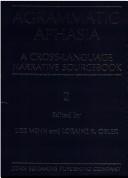
ISBN: 1556190247 9781556190247 Year: 1990 Publisher: Amsterdam: Benjamins,
Abstract | Keywords | Export | Availability | Bookmark
 Loading...
Loading...Choose an application
- Reference Manager
- EndNote
- RefWorks (Direct export to RefWorks)
Agrammatism. --- Aphasia. --- Agrammatism --- Aphasia --- Brain --- Language disorders --- Speech disorders --- Agrammatic aphasia --- Agrammatologia --- Grammatical speech disorders --- Speech disorders, Grammatical --- Grammaticality (Linguistics) --- Diseases
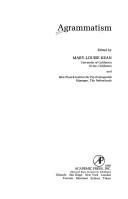
ISBN: 0124028306 1483277666 9780124028302 Year: 1985 Publisher: Orlando (Fla.): Academic press,
Abstract | Keywords | Export | Availability | Bookmark
 Loading...
Loading...Choose an application
- Reference Manager
- EndNote
- RefWorks (Direct export to RefWorks)
Aphasia --- Linguistics. --- Agrammatism --- Agrammatic aphasia --- Agrammatologia --- Grammatical speech disorders --- Speech disorders, Grammatical --- Grammaticality (Linguistics) --- Linguistic --- psychology. --- Linguistics --- psychology --- Psycholinguistics --- Neuropathology --- Aphasia - psychology

ISBN: 1283548992 9786613861443 9027273510 9789027273512 9789027273512 902722045X 1556190247 9027220468 1556190255 9027220476 1556190263 9027220484 1556190271 9789027220455 Year: 1990 Publisher: Amsterdam Benjamins Publishing Cy
Abstract | Keywords | Export | Availability | Bookmark
 Loading...
Loading...Choose an application
- Reference Manager
- EndNote
- RefWorks (Direct export to RefWorks)
Agrammatism. --- Aphasia. --- Brain --- Language disorders --- Speech disorders --- Agrammatic aphasia --- Agrammatologia --- Grammatical speech disorders --- Speech disorders, Grammatical --- Aphasia --- Grammaticality (Linguistics) --- Diseases --- Psychiatry --- Neuropathology --- Psycholinguistics
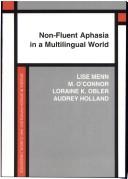
ISBN: 9027243352 1556193912 9786613424341 9027276366 1283424347 9789027243355 Year: 1995 Volume: 5 Publisher: Amsterdam: Benjamins,
Abstract | Keywords | Export | Availability | Bookmark
 Loading...
Loading...Choose an application
- Reference Manager
- EndNote
- RefWorks (Direct export to RefWorks)
"Non-fluent Aphasia in a Multilingual World" is an up-to-date introduction to the language of patients with non-fluent aphasia. Recent research in languages other than English has challenged our old descriptions of aphasia syndromes: while their patterns can be recognized across languages, the structure of each language has a profound effect on the symptoms of aphasic speech. However, the basic linguistic concepts needed to understand these effects in languages other than English have rarely been part of the training of the clinician."Non-fluent Aphasia in a Multilingual World" introduce
Bilingualism --- Agrammatism --- Aphasic persons --- Language --- Psycholinguistics --- Agrammatism. --- Bilingualism. --- Aphasia --- Aphasiacs --- Aphasics --- People with disabilities --- Language and languages --- Languages in contact --- Multilingualism --- Agrammatic aphasia --- Agrammatologia --- Grammatical speech disorders --- Speech disorders, Grammatical --- Grammaticality (Linguistics) --- Language. --- Patients --- Aphasic persons - Language

ISBN: 1283424347 9786613424341 9027276366 9789027276360 9027243352 9789027243355 9027243360 9789027243362 1556193912 9781556193910 1556193920 9781556193927 Year: 1995 Publisher: Amsterdam : Benjamins,
Abstract | Keywords | Export | Availability | Bookmark
 Loading...
Loading...Choose an application
- Reference Manager
- EndNote
- RefWorks (Direct export to RefWorks)
"Non-fluent Aphasia in a Multilingual World" is an up-to-date introduction to the language of patients with non-fluent aphasia. Recent research in languages other than English has challenged our old descriptions of aphasia syndromes: while their patterns can be recognized across languages, the structure of each language has a profound effect on the symptoms of aphasic speech. However, the basic linguistic concepts needed to understand these effects in languages other than English have rarely been part of the training of the clinician."Non-fluent Aphasia in a Multilingual World" introduce
Agrammatism. --- Bilingualism. --- Aphasic persons --- Aphasia --- Aphasiacs --- Aphasics --- People with disabilities --- Language and languages --- Languages in contact --- Multilingualism --- Agrammatic aphasia --- Agrammatologia --- Grammatical speech disorders --- Speech disorders, Grammatical --- Grammaticality (Linguistics) --- Language. --- Patients
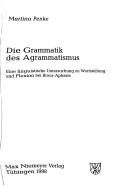
ISSN: 03446727 ISBN: 3484303786 9783484303782 3111848132 3110914689 Year: 1998 Volume: 378 Publisher: Tübingen: Max Niemeyer,
Abstract | Keywords | Export | Availability | Bookmark
 Loading...
Loading...Choose an application
- Reference Manager
- EndNote
- RefWorks (Direct export to RefWorks)
Im Agrammatismus, einer Sprachstörung infolge einer Hirnschädigung, sind Wortstellung und Flexion beeinträchtigt. Diese Monographie legt eine empirische Studie zum Agrammatismus im Deutschen vor, die auf Spontansprachdaten und experimentell erhobenen Daten von elf Agrammatikern basiert. Im Zentrum der Studie steht die Frage, welche Komponenten der grammatischen Kompetenz im Agrammatismus geschädigt sind. Die Studie zeigt, daß im Bereich der Wortstellung keine qualitativen Unterschiede zu normalsprachlichen grammatischen Repräsentationen vorliegen. Die Stellung des Verbs wird im Agrammatismus wie im normalsprachlichen System von der Finitheit des Verbs und dem Satztyp (Haupt-/Nebensatz) abhängig gemacht. Argumente konnten topikalisiert und mit Objektkasus markiert werden. Selektive Beeinträchtigungen kennzeichnen dagegen den Bereich der Flexion. Die wesentlichen Ergebnisse sind: 1) das Default-Pluralflexiv -s ist geschädigt, die irregulären Pluralflexive sind erhalten; 2) die reguläre Partizipflexion ist erhalten, die irreguläre geringfügig beeinträchtigt; 3) die reguläre Kongruenzflexion ist beeinträchtigt, die irregulären Suppletivformen sind es jedoch nicht. Daß reguläre und irreguläre Flexionsformen vom Agrammatismus unterschiedlich betroffen werden, spricht dafür, daß sie auf verschiedenen kognitiven Prozessen basieren: Während reguläre Formen durch Affigierung gebildet werden, sind irreguläre Formen als Vollformen gespeichert. Die Relevanz dieser selektiven Defizite für die linguistische Theoriebildung wird diskutiert.
Afasie --- Afasie [Broca-] --- Agrammatism --- Agrammatisme --- Agrammatologia --- Aphasia --- Aphasia [Broca ] --- Aphasie --- Aphasie de Broca --- Grammatical speech disorders --- Speech disorders [Grammatical ] --- Grammar, Comparative and general --- Word order --- 803.0:801.5 --- Duits. Duitse taalkunde-:-Grammatica --- 803.0:801.5 Duits. Duitse taalkunde-:-Grammatica --- Agrammatism. --- Word order. --- Agrammatic aphasia --- Speech disorders, Grammatical --- Grammaticality (Linguistics) --- Language and languages --- Order (Grammar) --- Linguistics --- Philology --- Grammar, Comparative and general - Word order --- PSYCHOLINGUISTIK --- DEUTSCHE SPRACHE --- LANGAGE, TROUBLES DU --- SPRACHSTÖRUNGEN --- APHASIE
Book
ISBN: 9516532810 9789516532816 Year: 1995 Volume: 106 Publisher: Helsinki: Societas scientiarum Fennica,
Abstract | Keywords | Export | Availability | Bookmark
 Loading...
Loading...Choose an application
- Reference Manager
- EndNote
- RefWorks (Direct export to RefWorks)
Aphasia. --- Connectionism. --- Human information processing. --- Semantics. --- Agrammatism. --- Agrammatism --- Aphasia --- Connectionism --- Human information processing --- Semantics --- Formal semantics --- Semasiology --- Semiology (Semantics) --- Comparative linguistics --- Information theory --- Language and languages --- Lexicology --- Meaning (Psychology) --- Information processing, Human --- Bionics --- Information theory in psychology --- Perception --- Connexionism --- Cognition --- Brain --- Language disorders --- Speech disorders --- Agrammatic aphasia --- Agrammatologia --- Grammatical speech disorders --- Speech disorders, Grammatical --- Grammaticality (Linguistics) --- Diseases --- Aphasie
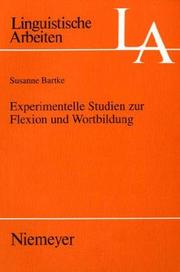
ISBN: 348430376X 3110914700 Year: 1998 Volume: 376 Publisher: Tübingen Max Niemeyer Verlag
Abstract | Keywords | Export | Availability | Bookmark
 Loading...
Loading...Choose an application
- Reference Manager
- EndNote
- RefWorks (Direct export to RefWorks)
Acquisition du langage --- Acquisition of language --- Agrammatism --- Agrammatisme --- Agrammatologia --- Grammatical speech disorders --- Langage [Acquisition du ] --- Language acquisition --- Language development in children --- Speech disorders [Grammatical ] --- Taalverwerving --- German language --- Inflection. --- Word formation. --- Acquisition --- Morphology (Linguistics) --- Number --- Word formation --- Inflection --- DEUTSCHE SPRACHE --- MORPHOLOGIE --- PLURAL --- SPRACHERWERB
Multi
ISBN: 9055690937 Year: 1999 Publisher: The Hague Thesus
Abstract | Keywords | Export | Availability | Bookmark
 Loading...
Loading...Choose an application
- Reference Manager
- EndNote
- RefWorks (Direct export to RefWorks)
Psycholinguistics --- Dutch language --- Grammar --- 803.93-56 --- Agrammatism --- -Grammar, Comparative and general --- -Comparative grammar --- Grammar, Philosophical --- Grammar, Universal --- Language and languages --- Philosophical grammar --- Linguistics --- Philology --- Flemish language --- Netherlandic language --- Germanic languages --- Agrammatic aphasia --- Agrammatologia --- Grammatical speech disorders --- Speech disorders, Grammatical --- Aphasia --- Grammaticality (Linguistics) --- Nederlands: syntaxis; semantiek --- Syntax --- Grammar, Comparative --- Theses --- Agrammatism. --- Grammar, Comparative and general --- Syntax. --- -Nederlands: syntaxis; semantiek --- 803.93-56 Nederlands: syntaxis; semantiek --- -Agrammatic aphasia --- Comparative grammar --- Grammar, Comparative and general Syntax
| Listing 1 - 10 of 11 | << page >> |
Sort by
|

 Search
Search Feedback
Feedback About UniCat
About UniCat  Help
Help News
News